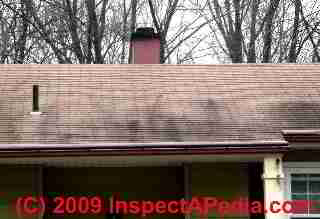Identification, cure & prevention of algae stains on roof surfaces:
Tests, removal or prevention of black algae & other stains on roof surfaces. This article explains methods used to test for and confirm black roof stains due to algae or "black fungal growth" on roof shingles. We provide a list of type of stains and colors that appear on roof shingles and on other roofing materials.
InspectAPedia tolerates no conflicts of interest. We have no relationship with advertisers, products, or services discussed at this website.
- Daniel Friedman, Publisher/Editor/Author - See WHO ARE WE?
Testing to Identify Roof Stain Material
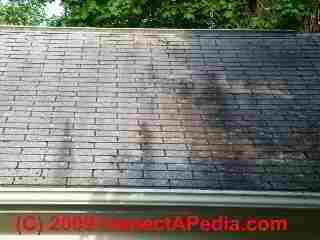 Some roofing consultants, including Mr. Norman (above) assert that all of the black stains on asphalt shingle roofs are due to algae growth.
Some roofing consultants, including Mr. Norman (above) assert that all of the black stains on asphalt shingle roofs are due to algae growth.
See ALGAE, FUNGUS, LICHENS, MOSS on ROOFS
But we found some experts describing an occasional product defect that produces extractive bleeding in asphalt roofing materials. Extractive bleeding occurs in other building materials as well.
See EXTRACTIVE BLEEDING on SHINGLES for more on extractive bleeding;
To test black roof debris for a determination of whether the black stains are due to soot, algae, fungus, or asphalt bleed-through our forensic lab will accept tape samples for processing at no fee between April 2009 and June 2009.
Select a roof material testing laboratory or any forensic or biological test lab that can identify mold, algae, and particles.
Use the tape sampling procedure and mailing instructions found at TEST KIT for DUST, MOLD, PARTICLES: INSTRUCTIONS to send off lab samples for testing. (No more than two samples per roof should be necessary. If pre-arranged by email, InspectApedia.com offers limited pro-bono roof stain sample analysis in our own forensic laboratory.)
Be sure to press your tape firmly into the black stain material.
Testing Black Roof Stain Material in the Forensic Lab
In our forensic laboratory (not on a roof itself) we prepare a microscope slide of black roof debris particles for direct examination at low and high magnification. Algae is identifiable by physical characteristics.
If the black material does not appear to be an organic structure we use a solvent on the microscope slide. Xylene or Hexane will cause asphalt products to bleed and stream on a microscope slide.

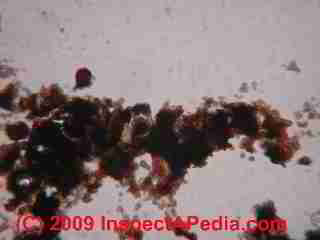
Our photos above show black stains on a roof and an initial lab photo of the black roof debris at 400x.
Sample material from the stained area on this roof was prepared on a microscope slice and mounted in lactic acid. Lactic acid does not dissolve asphalt but that will hydrate and expand algae and mold spores. The debris in our photo (above left) looks like brownish black something that is not organic.
But take a look at the photographs just below.
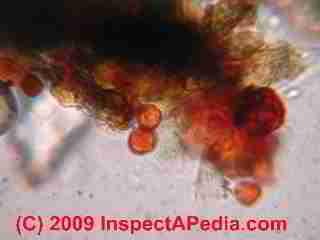
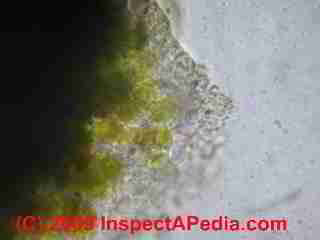
Here is what that same sample looks like under the microscope at 1000x, oil immersion, after allowing five minutes for hydration (expansion of the cells of material.)
We see a dark algae on the left and green algae on the right, both found in the same sample material. The black stains on the roof above are definitely algae, not bituminous material.
Testing Black Roof Stains On the Roof
Mr. Norman proposes a simple test of applying a light spray of a diluted mixture of trisodium phosphate [use a TSP substitute, not TSP which is an environmental contaminant] and chlorine (with water) in the proper proportion will determine weather or not this is algae quite readily. If it is asphalt pigment, it will not lighten.
If the residue is bitumen, a petroleum product would be necessary to remove it, but cleaning the roof with any solvent would of course be unwise as you will also damage the shingles as well as risk a fire, explosion, and environmental contamination.
This website tells readers how to identify & explain the most-common asphalt roof shingle failures and how to obtain asphalt roofing shingle failure claims assistance. These defects occur on organic-mat or fiberglass-mat asphalt roof shingles. Readers are also invited contribute roof failure information to the web author for research purposes. web author for research purposes.
...
Continue reading at BLACK ROOF STAIN CAUSES or select a topic from the closely-related articles below, or see the complete ARTICLE INDEX.
Or see these
Recommended Articles
- EFFLORESCENCE SALTS & WHITE DEPOSITS
- STAIN DIAGNOSIS on ROOFS
- STAINS on STONE, STUCCO DIAGNOSE & CURE
- STAIN DIAGNOSIS on ROOFS
- ALGAE, FUNGUS, LICHENS, MOSS on ROOFS
- ALGAE STAIN TEST METHODS
- BLACK ROOF STAIN CAUSES
- BLACK or GREEN ALGAE STAINS on ROOFS
- BLACK or GREEN ALGAE STAIN REMOVE / PREVENT
- STAINS on/near CHIMNEYS
- DEBRIS STAINS on ROOFS
- EXTRACTIVE BLEEDING on SHINGLES
- LICHENS on ROOFS
- MOSS on ROOFS
- POWER WASHING ROOFS
- RUST STAINS on ROOFS
Suggested citation for this web page
ALGAE STAIN TEST METHODS at InspectApedia.com - online encyclopedia of building & environmental inspection, testing, diagnosis, repair, & problem prevention advice.
Or see this
INDEX to RELATED ARTICLES: ARTICLE INDEX to BUILDING ROOFING
Or use the SEARCH BOX found below to Ask a Question or Search InspectApedia
Ask a Question or Search InspectApedia
Try the search box just below, or if you prefer, post a question or comment in the Comments box below and we will respond promptly.
Search the InspectApedia website
Note: appearance of your Comment below may be delayed: if your comment contains an image, photograph, web link, or text that looks to the software as if it might be a web link, your posting will appear after it has been approved by a moderator. Apologies for the delay.
Only one image can be added per comment but you can post as many comments, and therefore images, as you like.
You will not receive a notification when a response to your question has been posted.
Please bookmark this page to make it easy for you to check back for our response.
IF above you see "Comment Form is loading comments..." then COMMENT BOX - countable.ca / bawkbox.com IS NOT WORKING.
In any case you are welcome to send an email directly to us at InspectApedia.com at editor@inspectApedia.com
We'll reply to you directly. Please help us help you by noting, in your email, the URL of the InspectApedia page where you wanted to comment.
Citations & References
In addition to any citations in the article above, a full list is available on request.
- Shingle Shield™ are zinc strips that are inserted under the shingle tabs of individual shingles to reduce moss, lichens, and algae growth on asphalt roofing - see shingleshield.com
- StainhandleR are zinc strips that are inserted under the shingle tabs of individual shingles to reduce moss, lichens, and algae growth on asphalt roofing- see stainhandler.com
- Zinc-Shield® - zincshield.com and Z-stop™ zinc roofing strips - z-stop.com, are roll-out zinc strips intended for installation near the ridge of a roof to reduce moss, lichens, and algae growth on roofs
- 04/09: thanks to William M. Norman, P.E., S.E., Keeler-Webb Associates, 486 Gradle Drive, Carmel, IN 46032 for opening discussion regarding the legitimacy of extractive bleeding as a term to apply to asphalt roofing material. Mr. Norman suggests that many (not all) black stains on asphalt roofing may be due to algal growth. We will report progress in this discussion as updates to this web article.
- Our recommended books about building & mechanical systems design, inspection, problem diagnosis, and repair, and about indoor environment and IAQ testing, diagnosis, and cleanup are at the InspectAPedia Bookstore. Also see our Book Reviews - InspectAPedia.
- Best Practices Guide to Residential Construction, by Steven Bliss. John Wiley & Sons, 2006. ISBN-10: 0471648361, ISBN-13: 978-0471648369, Hardcover: 320 pages, available from Amazon.com and also Wiley.com. See our book review of this publication.
- Decks and Porches, the JLC Guide to, Best Practices for Outdoor Spaces, Steve Bliss (Editor), The Journal of Light Construction, Williston VT, 2010 ISBN 10: 1-928580-42-4, ISBN 13: 978-1-928580-42-3, available from Amazon.com
- The Journal of Light Construction has generously given reprint permission to InspectAPedia.com for this article. All rights and contents are ©Journal of Light Construction and may not be reproduced in any form.
- Architectural elements: the technological revolution: Galvanized iron roof plates and corrugated sheets; cast iron facades, columns, door and window caps, ... (American historical catalog collection), Diana S Waite, available used out of Amazon.
- Asphalt Roofing Residential Manual from ARMA the Asphalt Roofing Manufacturers Association Website https://www.asphaltroofing.org/product/residential-asphalt-roofing-manual/ ,
- Building Pathology, Deterioration, Diagnostics, and Intervention, Samuel Y. Harris, P.E., AIA, Esq., ISBN 0-471-33172-4, John Wiley & Sons, 2001 [General building science-DF] ISBN-10: 0471331724 ISBN-13: 978-0471331728
- Building Pathology: Principles and Practice, David Watt, Wiley-Blackwell; 2 edition (March 7, 2008) ISBN-10: 1405161035 ISBN-13: 978-1405161039
- Built-Up Roof Systems, Manual C.W. Griffin, Mcgraw-Hill (Tx); 2nd edition (July 1982), ISBN-10: 0070247838, ISBN-13: 978-0070247833
- Concrete Folded Plate Roofs, C. Wilby PhD BSc CEng FICE FIStructE (Author), Butterworth-Heinemann, 1998, ISBN-10: 0340662662, ISBN-13: 978-0340662663
- Concrete Shell Roofs, C. Wilby PhD BSc CEng FICE FIStructE (Author),
- Concrete Dome Roofs (Longman Concrete Design and Construction Series),
- Concrete Roofing Tile, History of the, Batsford, 1959, AISN B000HLLOUC (availble used)
- Copper Roofing, by CDA
- Copper Roofing, Master specifications for copper roofing and sheet metal work in building construction: Institutional, commercial, industrial, I.E. Anderson, 1961 (hard to find)
- Corrugated Iron, Building on the Frontier, Simon Holloway
- Green Roof Plants: A Resource and Planting Guide, Edmund C. Snodgrass, Lucie L. Snodgrass, Timber Press, Incorporated, 2006, ISBN-10: 0881927872, ISBN-13: 978-0881927870. The text covers moisture needs, heat tolerance, hardiness, bloom color, foliage characteristics, and height of 350 species and cultivars.
- Green Roof Construction and Maintenance, Kelley Luckett, McGraw-Hill Professional, 2009, ISBN-10: 007160880X, ISBN-13: 978-0071608800, quoting: Key questions to ask at each stage of the green building process Tested tips and techniques for successful structural design Construction methods for new and existing buildings Information on insulation, drainage, detailing, irrigation, and plant selection Details on optimal soil formulation Illustrations featuring various stages of construction Best practices for green roof maintenance A survey of environmental benefits, including evapo-transpiration, storm-water management, habitat restoration, and improvement of air quality Tips on the LEED design and certification process Considerations for assessing return on investment Color photographs of successfully installed green roofs Useful checklists, tables, and charts
- Handbook of Building Crafts in Conservation, Jack Bower, Ed., Van Nostrand Reinhold Company, NY 1981 ISBN 0-442-2135-3 Library of Congress Catalog Card Nr. 81-50643.
- Historic Preservation Technology: A Primer, Robert A. Young, Wiley (March 21, 2008) ISBN-10: 0471788368 ISBN-13: 978-0471788362
- Wood Shingle Roofs, Care and Maintenance of wood shingle and shake roofs, (EC), Stanley S. Niemiec (out of print)
- In addition to citations & references found in this article, see the research citations given at the end of the related articles found at our suggested
CONTINUE READING or RECOMMENDED ARTICLES.
- Carson, Dunlop & Associates Ltd., 120 Carlton Street Suite 407, Toronto ON M5A 4K2. Tel: (416) 964-9415 1-800-268-7070 Email: info@carsondunlop.com. Alan Carson is a past president of ASHI, the American Society of Home Inspectors.
Thanks to Alan Carson and Bob Dunlop, for permission for InspectAPedia to use text excerpts from The HOME REFERENCE BOOK - the Encyclopedia of Homes and to use illustrations from The ILLUSTRATED HOME .
Carson Dunlop Associates provides extensive home inspection education and report writing material. In gratitude we provide links to tsome Carson Dunlop Associates products and services.


